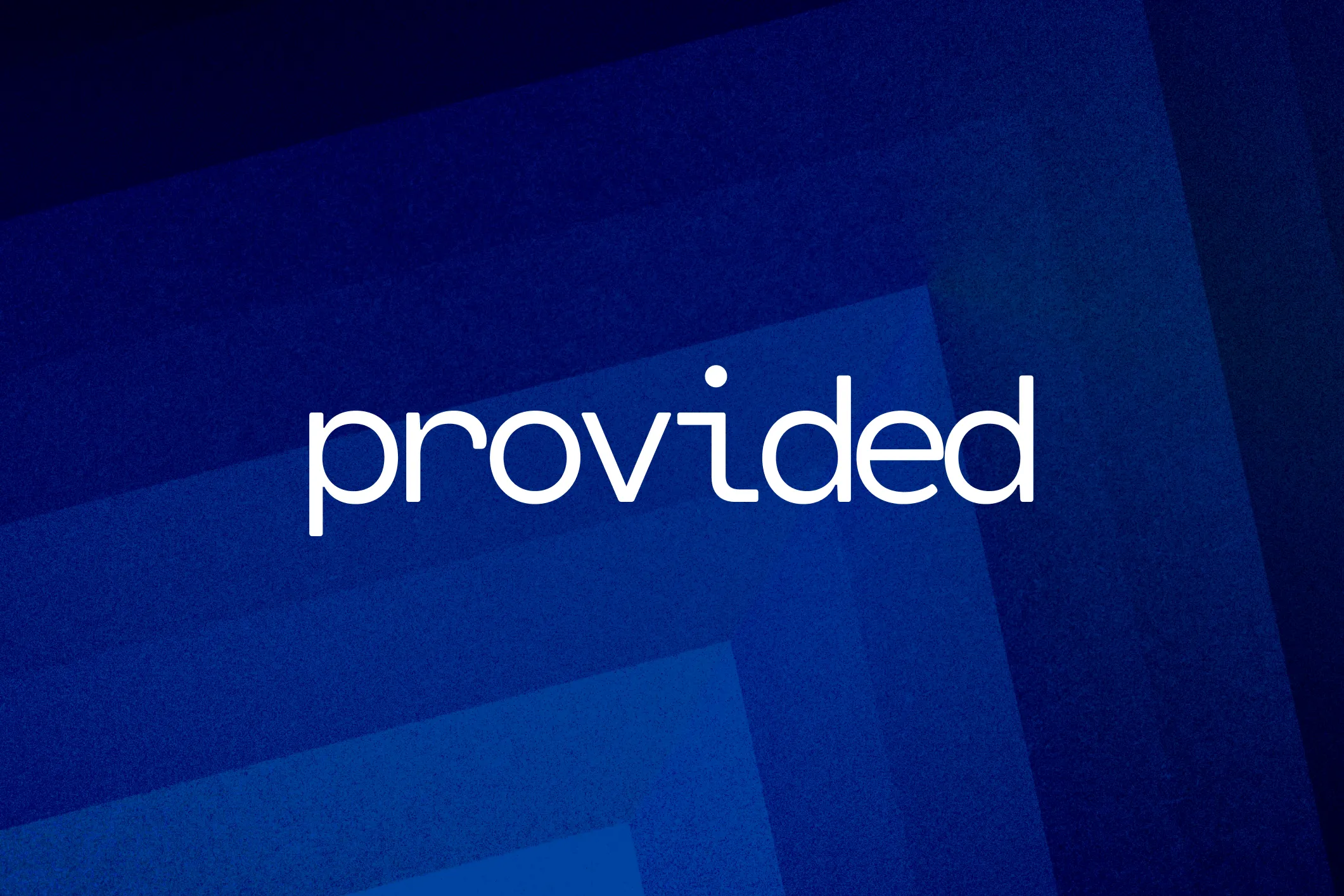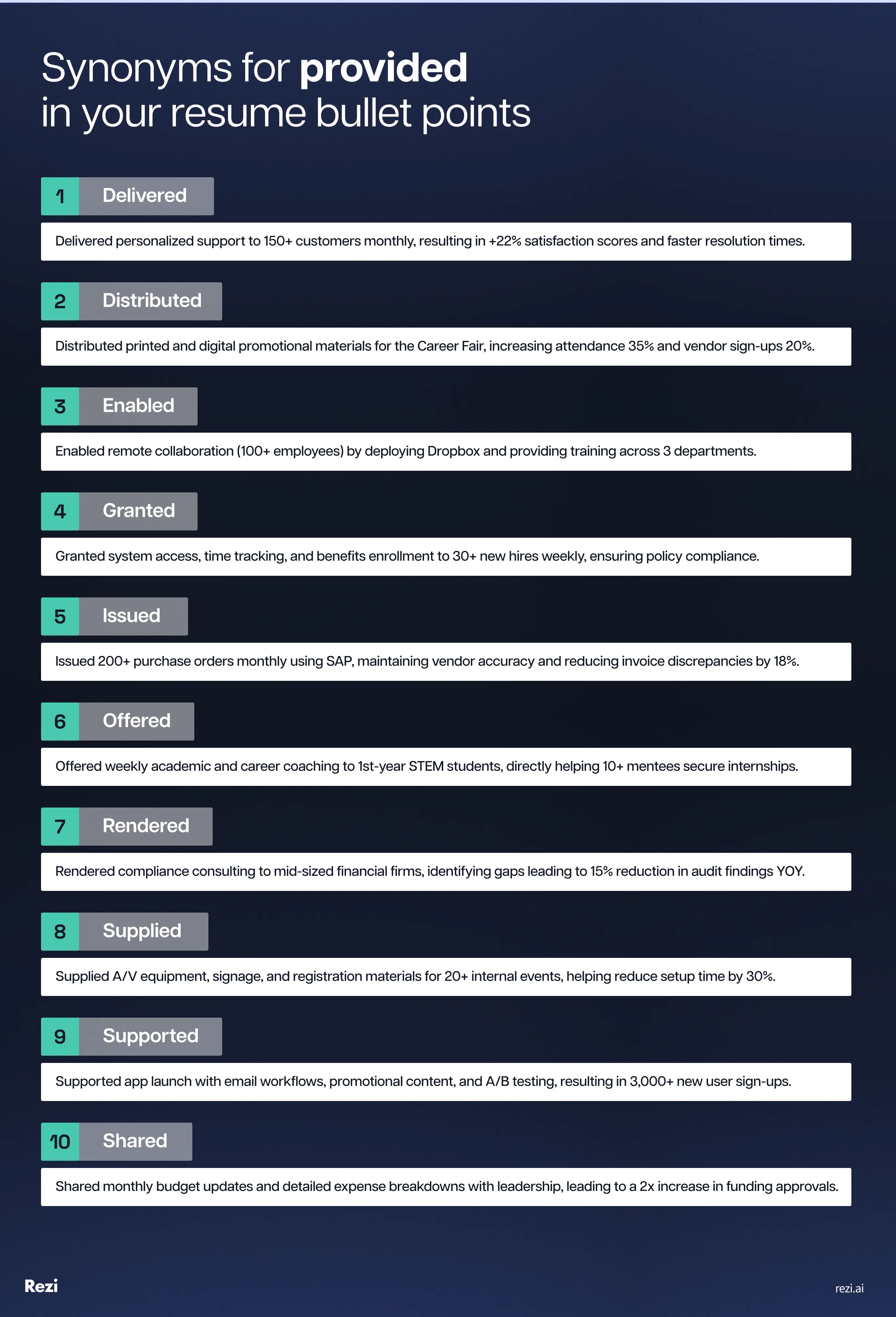Tired of saying “provided” on your resume? Try these 30+ stronger verbs (with examples) to highlight what you really did and why it mattered.



The word “provide” shows up a lot on resumes, and for good reason. It’s a useful verb that means to give, supply, or make something available. You’ve probably written phrases like “provided technical support” or “provided training to new employees.”
But using “provide” over and over can make your resume sound a bit bland and repetitive. It doesn’t always capture the full impact of what you did. That’s where stronger, more specific verbs come in. Swapping “provide” for a word that better fits your role can help your resume feel sharper, more polished, and more impressive.
In this guide, you’ll find:
- 30+ great alternatives to “provide.”
- Resume examples for how to use the synonyms.
- Tips for when “provide” is still the best choice.
Want to skip the writing and let AI do the heavy lifting? Try out the Rezi AI Resume Builder.
Or if you’re into DIY-ing your resume, check out these helpful guides:
- Update Your Resume & Make It 2x Better
- Tips for Using ChatGPT to Write a Good Resume
- How to Write a Resume With No Experience (+ Examples)
- Tailor a Resume to a Job Posting
30+ Resume Synonyms for “Provide”
If you’ve been leaning on the word “provide” in your resume, we get it — it’s a common choice because it’s simple and flexible. But swapping it out for more specific, action-oriented verbs can make your resume stronger and your impact clearer.
Below is a list of powerful, resume-ready synonyms to help you say exactly what you did with more precision and punch:
Check out these resume examples using the synonyms across different roles and industries:

How to Replace “Provide” with Synonyms on Your Resume
Before you start replacing every “provided” on your resume with a synonym, look at the difference a well-chosen word can make. Each example below shows how, by changing up the words and adding more detail, you can make your experience sound more specific, confident, and impossible to skim past.
Administered vs. Provided
“Administered” gives your work more weight and shows you didn’t just give support, you managed it. It emphasizes control, responsibility, and technical oversight.
“Provided IT support for over 100 users.”
“Administered IT systems and user support for 100+ staff members, ensuring secure access and minimal downtime.”
Authored vs. Provided
By using “authored,” you highlight ownership and creative input. It suggests you created original documentation, not just passed along existing materials.
“Provided documentation for software development.”
“Authored detailed technical manuals and user guides for a mobile health app, improving usability for both patients and clinicians.”
Catered vs. Provided
“Catered” adds a personal, patient-centered tone. It demonstrates you adapted care to each individual’s needs, which speaks volumes about your attentiveness and professionalism.
“Provided care to patients with varying medical needs.”
“Catered personalized care to elderly patients in a long-term care facility, aligning with individual treatment plans and family preferences.”
Conducted vs. Provided
“Conducted” makes it sound like you really took the lead on the analysis — you owned the process, not just pitched in. It gives structure, intent, and credibility to your work.
“Provided data analysis for market research.”
“Conducted performance analysis on ad campaigns in the e-commerce space, helping the marketing team increase ROI by 20%.”
Delivered vs. Provided
“Delivered” focuses on results. It emphasizes that you followed through and resolved issues. That’s especially effective in customer-facing roles where outcomes matter most.
“Provided solutions for customer complaints.”
“Delivered prompt, empathetic resolutions to customer complaints, improving online ratings by 1.5 stars over 6 months.”
Distributed vs. Provided
“Distributed” hints at coordination and logistics. It places you in the middle of operations — moving resources or information to the right place.
“Provided marketing materials to regional offices.”
“Distributed branded promotional materials across 10+ retail locations nationwide, ensuring uniform messaging and timely seasonal rollouts.”
Enabled vs. Provided
“Enabled” makes it clear that your work empowered others. It shifts focus from what you handed out to the impact of your support — you helped people do their jobs better.
“Provided financial analysts with access to software tools.”
“Enabled financial analysts with secure access to real-time data tools, accelerating reporting cycles and improving forecast accuracy.”
Facilitated vs. Provided
“Facilitated” signals leadership and communication. It tells hiring managers you were involved in planning and helping others get up to speed, not just ticking off a checklist.
“Provided training to new teachers on company policies.”
“Facilitated onboarding workshops for new teachers, covering school policies, classroom tech tools, and behavioral standards.”
Generated vs. Provided
“Generated” adds a creative element. It shows that you were a source of ideas, not just part of the execution.
“Provided creative ideas for marketing campaigns.”
“Generated fresh social media concepts for a local nonprofit, increasing online engagement and volunteer sign-ups by 40%.”
Issued vs. Provided
“Issued” clarifies you were responsible for a formal process, not just casually helping out. It emphasizes reliability, accountability, and attention to detail — all key in structured work environments.
“Provided company laptops to new hires.”
“Issued secure laptops and onboarding kits to new employees in a remote-first startup, helping them get productive from day one.”
Offered vs. Provided
“Offered” suggests you were proactive and supportive — not just doing a task, but helping others grow. It highlights your leadership style and people skills in a way that “provided” doesn’t.
“Provided feedback to improve team performance.”
“Offered regular performance feedback to junior chefs, helping streamline kitchen operations and reduce plating errors.”
Presented vs. Provided
“Presented” elevates the task — it suggests public speaking or formal communication, not just sharing a document. It points to confidence and clarity in conveying information.
“Provided reports to management on project progress.”
“Prepared and presented detailed progress updates to municipal leaders during a public infrastructure project.”
Want to show off your communication skills? Check out: Best Resume Communication Skills.
Proposed vs. Provided
With “proposed,” you’re positioned as someone who contributes ideas proactively. It brings out your strategic thinking and willingness to improve existing systems.
“Provided recommendations for process improvements.”
“Proposed workflow changes to improve patient intake at a clinic, reducing wait times by 30%.”
Supplied vs. Provided
“Supplied” captures the logistical value of your role. It gives weight to your involvement in making sure teams had the tools and resources to meet deadlines.
“Provided resources for construction crews to complete projects.”
“Supplied construction crews with critical equipment and materials, ensuring on-time project completion despite supply chain challenges.”
Supported vs. Provided
“Supported” brings out your reliability and teamwork skills. It signals that you were in the trenches, actively involved in making a product launch successful.
“Provided assistance during product launches.”
“Supported the launch of a new investment platform by coordinating client outreach, training sessions, and follow-up communication.”
Best “Provide” Synonym Examples
These are the strongest alternatives to “provide” — the ones that carry real weight, show off your strengths, and help your resume stand out.
1. Delivered
“Delivered” is all about results. It implies that you got things done, whether that’s a project, a service, or a solution. It’s perfect for roles in customer service, logistics, marketing, or project management.
Examples:
• Delivered onboarding sessions that helped reduce new hire ramp-up time by 30%.
• Delivered weekly performance reports to leadership to guide strategic decisions.
• Delivered design assets to clients ahead of schedule, improving client satisfaction and retention.
2. Distributed
“Distributed” makes you sound organized and operational, like you handled coordination, logistics, or communication at scale. It’s great for roles in admin, operations, supply chain, retail, or field support.
Examples:
• Distributed training materials across five departments to support company-wide software rollout.
• In a student leadership role, I distributed event flyers to promote campus workshops.
• Distributed updated safety protocols to over 300 field employees.
3. Enabled
“Enabled” emphasizes the impact of your work — how you helped others succeed. It’s ideal for tech, project-based, or support roles like IT, HR, engineering, or product management, where your work directly impacts team performance or end-user success.
Examples:
• Enabled cross-functional teams to collaborate more effectively by setting up a shared Asana dashboard to track project milestones, task ownership, and deadlines.
• Enabled smoother client onboarding by developing a step-by-step intake process.
• Enabled access to digital resources for remote students through a university-led outreach program.
4. Granted
“Granted” implies authority and trust. Use it when you had control over access, approvals, or permissions — particularly in HR, IT, finance, or healthcare settings.
Examples:
• Granted user access to proprietary financial software, ensuring proper credentialing and compliance.
• As an HR intern, granted PTO approvals based on company policy and staffing needs.
• Granted customer refunds based on service quality reviews and escalation protocols.
5. Issued
“Issued” shows process and structure — it’s perfect when describing formal tasks like equipment handouts, compliance docs, or onboarding materials. It works well in HR, operations, IT, or government roles.
Examples:
• Issued ID badges and orientation materials to over 150 new hires annually.
• Issued updated compliance forms to all departments during quarterly audits.
• Issued product licenses to clients post-purchase as part of the support team.
6. Offered
“Offered” gives your feedback a more intentional, thoughtful tone. It shows you didn’t just give feedback because it was expected — you took the initiative to support and guide others. This is especially impactful in mentorship, leadership, or team-building roles.
Examples:
• Offered personalized support to customers, resolving issues and boosting satisfaction scores by 18%.
• Offered guidance and career advice to interns during a summer mentorship program.
• In class council, offered suggestions for improving event accessibility that were later adopted.
7. Rendered
“Rendered” has a polished, service-oriented feel. It’s ideal when describing professional or high-quality services, especially in client work, legal, medical, or consulting.
Examples:
• Rendered translation services for non-English-speaking clients in a legal aid clinic.
• Rendered patient care during night shifts, maintaining high satisfaction scores in post-visit surveys.
• Rendered graphic design services for over 15 client projects as a freelance consultant.
8. Supplied
“Supplied” is straightforward and dependable — it shows you provided the tools or materials people needed to do their jobs. It’s a solid choice for logistics, events, construction, or operational roles.
Examples:
• Supplied volunteers with safety vests and printed instructions during a city-wide cleanup event.
• Supplied the marketing team with updated lead lists for weekly outreach campaigns.
• Supplied audio-visual gear for all student events as part of the campus tech team.
9. Supported
“Supported” is a classic — it shows you were reliable, helpful, and essential to a team or project’s success. It’s a go-to for team-based environments like admin, healthcare, education, and IT.
Examples:
• Supported senior developers by managing QA testing during multiple sprint cycles.
• Supported nurses with non-clinical tasks to improve patient care response times.
• Supported professors with lab prep and grading as part of a teaching assistant role.
10. Shared
“Shared” has a friendly, collaborative tone. It works well when describing communication, teamwork, or knowledge-sharing, especially in education, team-based roles, or any job where collaboration is key.
Examples:
• Shared weekly project updates with stakeholders to maintain alignment and transparency.
• Shared best practices across sales teams to improve consistency and boost conversions.
• Shared educational materials and workshop notes with classmates to support group learning.
When You Should Still Use “Provide” in Your Resume
“Provide” gets knocked for being vague, but it’s not always the wrong choice. Sometimes it’s the clearest way to describe what you did, especially in roles focused on support, care, or access.
- Use “provide” when it truly fits. If your job was to “provide patient care,” “provide technical support,” or “provide access to resources,” then just say that. There’s no need to overcomplicate things with a flashier verb if “provide” communicates your role clearly and directly.
- Swap it out if it feels too vague. “Provided training” doesn’t tell anyone what your real involvement was. Did you design the materials? Lead a session? Coordinate logistics? Choose a verb that shows what part you owned.
- Watch out for verbs that downplay your impact. “Provided support” or “provided help” can undersell your contribution. Ask yourself what you really did — maybe you coached, troubleshot, or managed.
- Pick a verb that fits your level of ownership. If you ran the show, go with action-forward verbs like “delivered,” “facilitated,” or “led.” But if you played more of a collaborative or supporting role, words like “supported” or “offered” might be more accurate.
- Add numbers to give context. Whatever word you choose, backing it up with results helps. For example: “Supplied equipment to 15+ teams weekly” hits harder than just “provided equipment.”
- Choose initiative-focused verbs in student or volunteer work. If you “shared ideas” or “offered help,” that’s great. But if you started something from scratch, communicate that with stronger verbs like “launched,” “organized,” or “created.”
FAQ
What is another way to say provided customer service on a resume?
Try something more active and results-focused, like “delivered exceptional support to customers” or “resolved customer inquiries with empathy and speed.” If you handled tough situations, you might say “handled escalations” or “addressed client concerns to improve satisfaction scores.” The key is to show what kind of service you gave and its impact.
What is another word for offer on a resume?
“Offer” can be great when you’re showing initiative or support, but there are often stronger options depending on context. For example, if you’re talking about solutions or ideas, try “proposed” or “recommended.” If it’s about helping people, go with “provided,” “extended,” or “delivered.” And for mentorship or advice, “guided” or “advised” might hit the mark better.
What is a synonym for providing guidance?
If you want to step up from “provided guidance,” think about how involved you were. “Mentored,” “coached,” or “advised” all sound more personal and hands-on. If you led a team or helped others grow, “supported professional development” or “guided junior team members” can show leadership without overstating it. Use something that reflects both your intention and your role.
What is a synonym for provide an opportunity to?
You could replace it with “enabled,” “facilitated,” “granted,” or even “empowered,” depending on what you’re describing. For example:
- Instead of “provided an opportunity for interns to present,” try “enabled interns to present project outcomes to leadership.”
- Rather than “provided an opportunity to grow,” write “supported growth through structured training.”
What are good words to use on a resume?
Use strong, specific verbs like “delivered,” “implemented,” “led,” and “developed” to show ownership and results. Avoid vague phrases like “responsible for” and focus on verbs that emphasize how you added value.



